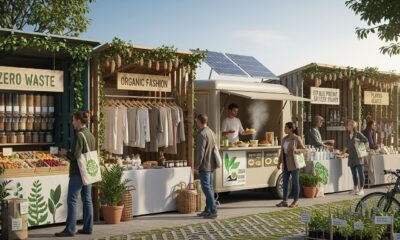

Features
Is a passion for fashion compatible with a concern for the world around us?
Do you ever wonder what your jeans have got to do with ethics? Your shirt with water levels? How your pants may be affecting social rights on the other side of the world? Probably not, if you are like the majority of people, despite the exponential growth of a concern for ethical fashion.
However, the recent events in Bangladesh have cast a more critical eye on clothing and its path to the consumer, as it seems that what we wear on the outside may be wearing out our world in many ways.
After the collapse of the Rana Plaza building and the death of 1,127 people, ignorance can no longer be used as the blissful excuse that it often affords.
Like the food we put into our bodies, the clothes we put on them are our own choices, and those choices reflect our personalities. During the Lords’ second debate on ethics and sustainability in March, Lady Young of Hornsey raised an important point about fashion that is often used to justify its aspirational and addictive nature.
Rather than just being garments to adorn ourselves in, they are “an expression of our professional and personal identities, an expression of where and how we see ourselves”, she said.
We know that jumpers that cost roughly the same price as your morning coffee cannot possibly be produced in an ethical manner, yet still we keep purchasing
When taken in the context of ethical fashion, what does that say about most people? That we just don’t care?
The current demand for speedy conversion of catwalk styles to high street garments means that there simply isn’t time for sustainable and fair manufacturing processes. Short turnarounds and instantaneous celeb copying would not be possible if social impact, the use of pesticides, labour resources and fair wages, minimising water usage, eco-friendly fabrics, recycling and fair use of resources were all addressed.
Is this enough of an excuse – simply because we don’t have time?
As ever, the question is one of taking responsibility. It is one of those strange quirks of citizens of any society that whilst they may cite themselves to be free and capable of thinking for themselves, direction from governments and corporations is often needed.
A lack of direction from above serves as an excuse for not taking action. We need someone to not only suggest that we pull our heads from the sand, but to literally drag them out for us.
Most consumers are aware of the basic laws of economics, and so education can’t be used as an excuse. Despite the fact that overall retail sales were down 0.7% in the first quarter of 2013, Primark sales rose by 24%.
And I’m not picking on Primark – tags for Wal-Mart, Sears Holdings Inc, Walt Disney Company and other big brand retailers were all found amongst the debris of another Bangladesh factory destroyed by fire back in November. Meanwhile, George at Asda, Matalan and River Island also all failed to sign up to a legally binding initiative to offer financial support for fire safety and building improvements in the wake of most the recent big factory collapse.
We know that jumpers that cost roughly the same price as your morning coffee cannot possibly be produced in an ethical manner, yet still we keep purchasing.
The end price of a garment reflects the investment that has been made in the people and product throughout the whole supply chain, and when something is on the market for pittance a similar proportion of care has been put into its creation. This fact is easy to ignore when not displayed directly in front of you, and this disconnection does wonders for appeasing our conscience and lining corporate pockets.
Of the $2 billion worth of exports leaving Bangladesh each year, 78% are clothes – the vast majority making their way to the UK and US. In this country alone there are over 8,000 garment factories, employing 3.6 million workers, of which 80% are women.
As well as not being practical, it would be not be ethical to suddenly stop sourcing clothing from these countries, as this would lead to the economy and infrastructure to plummet. Bound up in what we wear are therefore issues of a whole economy, social norms, gender equality and ecological impact.
No simple solution shouts out. What is necessary is for a sustainable and ethical economy and infrastructure throughout the whole chain – Bangladesh to Britain.
One way that this has been expressed is in terms of the triple bottom line – social, environmental and commercial. Experience has proven that without a robust financial business model, long-term change is not feasible, but unless the social and environmental impact is considered meaningful, business practice is impossible.
Responding to market needs and expectations can however mean more than pleasing stakeholders. If consumers and business people expect that the groups they interact with will maximise benefits to people and communities whilst minimising impact on the environment, this will have to be something that companies respond to.
More government intervention is cited as an important driver of change – but we haven’t seen this work for recycling. Local laws will always have some kind of impact. Traffic lighting of clothes has also been suggested, but the vast number of definitions of ‘ethical’ means that this would be difficult to quantify. So perhaps the answer really is to take grassroots action.
As well as profits, corporate reputation means a lot to companies, and thus consumers do have the power to make changes. However it is not easy. People Tree, probably the leader in the ethical fashion industry has been trading for 20 years, and is yet to break even in the UK.
But as the path consumables take to reach the consumer becomes even more important, and it is clear what affect your £3 t-shirt is having, consider taking your money to some of these retailers.
Gossypium – fair trade organic cotton clothing
Beyond Skin – this company have been making vegan shoes since 2001 – and there is not a moccasin in site
Charlie Boots – womenswear and accessories made in the UK from ethically sourced materials such as organic, sustainable, fair trade and vintage fabrics
Love Me Again – an independent fashion label that uses entirely recycled textiles unique and affordable clothes
Fashion Conscience – a hub for all things stylish and sustainable
Francesca Baker is curious about life and enjoys writing about it. A freelance journalist, event organiser, and minor marketing whizz, she has plenty of ideas, and likes to share them. She writes about music, literature, life, travel, art, London, and other general musings, and organises events that contain at least one of the above. You can find out more at www.andsoshethinks.co.uk.
Further reading:
Bangladesh tragedy ‘could have been avoided’
Sustainable fashion: an oxymoron?


 Environment12 months ago
Environment12 months agoAre Polymer Banknotes: an Eco-Friendly Trend or a Groundswell?

 Features11 months ago
Features11 months agoEco-Friendly Cryptocurrencies: Sustainable Investment Choices

 Features12 months ago
Features12 months agoEco-Friendly Crypto Traders Must Find the Right Exchange

 Energy11 months ago
Energy11 months agoThe Growing Role of Solar Panels in Ireland’s Energy Future




























